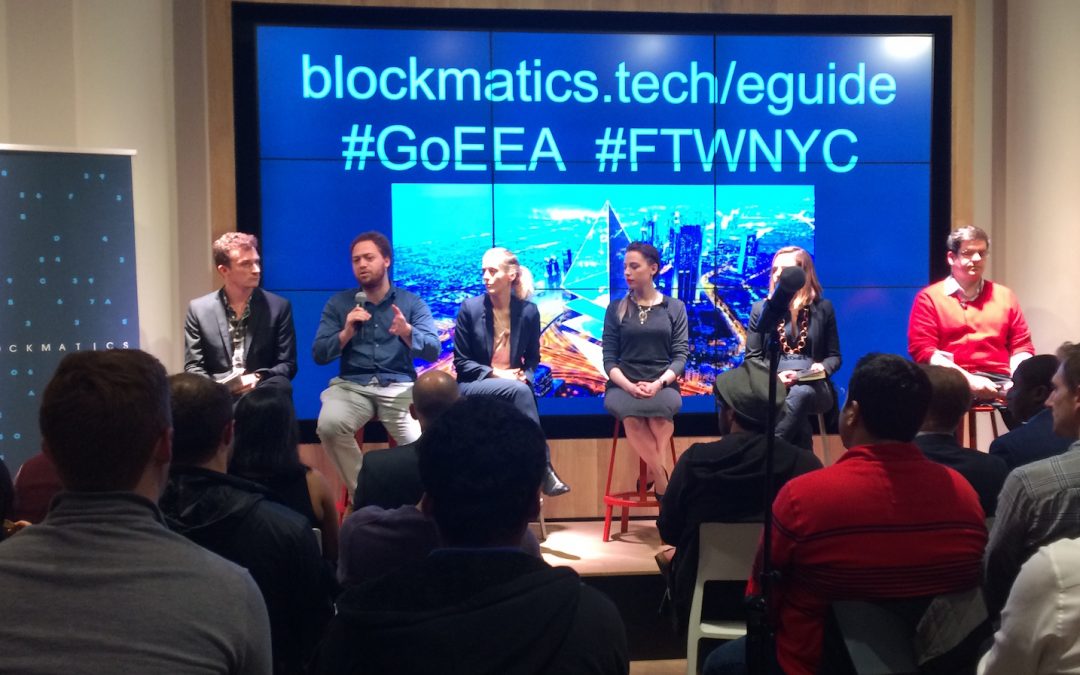The newly launched Enterprise Ethereum Alliance (EEA) might not be as aligned as its name suggests.
Launched in February, the group of ethereum startups and enterprise institutions aims to leverage large corporate investment in the private ethereum blockchain in a way that also strengthens the public blockchain. To share more about the current state of EEA, as well as its direction going forward, several members of the group gathered at the the Rise fintech accelerator in New York.
At the event, hosted by New York research and education firm Blockmatics, a panel consisting of representatives from JP Morgan, BNY Mellon, ConsensSys, Monax and BlockApps provided insight into the complexities of forming consensus with so many disparate interests.
The most heated part of the evening involved discussion of funding via cryptographic token sales, also known as ‘initial coin offerings’ (ICOs).
In response to a question from the audience about how to conduct an ICO in a trustworthy way, Monax COO and general council Preston Byrne doubled-down on his well-known critical stance of the model, while another panelist defended it and one even did the blockchain equivalent of pleading the Fifth.
‘Dumb money’
Though it seems possible to craft crypto tokens in a way that would prevent them from being categorized as securities (and hence coming under more stringent controls), the end result is similar in that they let firms raise money for projects through investors.
Byrne’s issue with the ICO model is that it is frequently used by groups who have little more than a white paper to show the potential investors, and who rarely have proven market demand for their product.
Byrne said:
“They take a startup’s incentives as a model and turn it on its head. Which is, they’re supposed to produce some product, they’re supposed to build a business.”
Instead, he argued, those who use ICOs to raise money are “exploitative, abusive” in turning to what was called “dumb money” multiple times throughout the night – a reference to people who don’t fully understand what they’re investing in.
“They have no redeeming characteristics whatsoever,” Byrne said, describing the risks of participating in an ICO, warning:
“May god have mercy on the souls of those who invest in them.”
Global movement?
On the other side of the debate, ConsenSys executive director of enterprise and social impact, Vanessa Grellet, heralded ICOs as a progressive departure from more traditional venture capital structures.
Though ConsenSys – a startup building decentralized applications on ethereum – itself isn’t directly funded by an ICO, it has benefited from ethereum’s original token sale, which could be considered the success story and progenitor of the idea.
Grellet cited the controversial ICO of the ConsenSys ‘spoke’ Gnosis, in which a $12m raise gave the firm a valuation of about $300m based on unsold tokens, as an example of a “very successful” implementation of the investment vehicle.
Stating that she believes regulation around token sales will “relax itself” to take into account the new funding model, Grellet added:
“It will grow. It’s a global movement, it’s not going to stop and it’s a wonderful way to get your startup going.”
Nothing to see here
Perhaps indicative of the different strategies employed by the startups and the enterprises involved with the EEA, both panelists representing enterprise banks – Amber Baldet, JP Morgan’s blockchain program lead, and Allison Paz, a fintech senior analyst at BNY Mellon – remained silent on the issue.
Similarly, Kieren James-Lubin, founder of BlockApps (another ConsenSys spoke), merely said: “I’m not saying anything.”
While the mood in the room was occasionally heated, the group exited stage left in what seemed like good spirits.
Before leaving, Byrne jokingly called himself the “problem child” of the EEA, and further described a series of other internal debates surrounding the mechanism by which consensus should be achieved and more.
He further explained that the discussions were all part of the normal growing pains of such a group and would likely be resolved over time.
He concluded:
“It’s a question of everyone getting to know each other.”
Image via Michael del Castillo for CoinDesk










